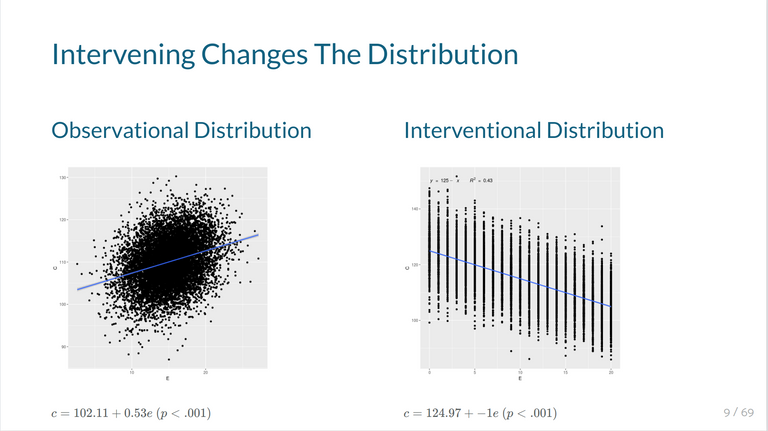
We've all been taught that correlation does not imply causation. This is why we use randomized controlled trials, when possible, to clearly test whether some factor (such as salt) affects some other variable (such as blood pressure). If we just look at salt consumption outside of a controlled study, we may find an association between salt intake and blood pressure, but that association could be due to another factor that raises both salt and blood pressure. People who eat a lot of fast food will get a lot of salt and a lot of calories. It may be that the weight gain actually causes the high blood pressure, not the salt. Unfortunately, we cannot always easily conduct controlled trials to look for causal effects. Imagine trying to do a controlled trial on the long-term effects of smoking on lung cancer. To do this, you would have to randomly force half the subjects to smoke a specific number of cigarettes per day and force another half to not smoke. This would be unethical and probably difficult to enforce. Even with salt, some are pushing for a controlled trial using volunteers from prisons, where the food could be precisely controlled for years.
While randomized control trials will continue to be the gold standard for testing causal effects, the last several decades has seen considerable breakthroughs in inferring causal effects from observational data, such as that found in electronic health records and public health surveillance systems. Use of this data to develop possible causal hypotheses, or estimate causal effects is an essential part of a learning healthcare system.
When I started to learn about causal inference, I found the literature very confusing, even though there are many well-written papers and books on the subject. It was as if different blind men were each describing part of an elephant. When I get that confused, I find it best to make a lecture to teach someone else the topic. The first draft of that presentation is now available on Github Pages. The presentation is dynamically generated using R Markdown and the excellent presentation package xaringan. All of the code is available through the Github repo.
You can view the slides here: https://tjohnson250.github.io/overview_causal_inference/overview_causal_inference.html#1
And view the code at this repo: https://github.com/tjohnson250/overview_causal_inference
To support this post please upvote, follow @toddrjohnson, and consider using one of my referral links below:
Honeyminer: Start mining bitcoin in 1 minute

This is a good read, I don't remember learning about this anymore.
Excellent article, takes me back to uni days! 😊
Posted using Partiko Android
Holy shot that is some great in-depth information now on the blockchain. Humble me to see such analytical study and makes me happy there are folks here much smarter than I am!!
Correlation does not imply causation. What a monumental statement. Simple for you I suppose but a great way for me to discount people who assume otherwise.
Right on man!
Posted using Partiko iOS
Very technical subject matter, you may not get many readers but those you do get will appreciate it.
Congratulations @toddrjohnson! You have completed the following achievement on the Steem blockchain and have been rewarded with new badge(s) :
You can view your badges on your Steem Board and compare to others on the Steem Ranking
If you no longer want to receive notifications, reply to this comment with the word
STOPVote for @Steemitboard as a witness to get one more award and increased upvotes!
Yea salt intake also increases water retention in the body which increases weight gain. Don't know how the conclusion was drawn though or how the trials were made. A very tough subject there.
Hi Todd. A lot of technical info..almost too deep for my pea brain. 😂
Nice to see some science and well thought out research on the platform again! There are so many variables to consider when something as complex as the human body is being researched. This is why one paper will say certain foods or exercise are bad for you and another will say it's the best thing ever!
To say it's one thing causing something is almost impossible because if you don't sleep well, other hormones are being released and can affect measurements. But control groups are absolutely essential in any testing, especially of humans, to keep the results comparable.
Thanks for sharing your research here.
Posted using Partiko Android